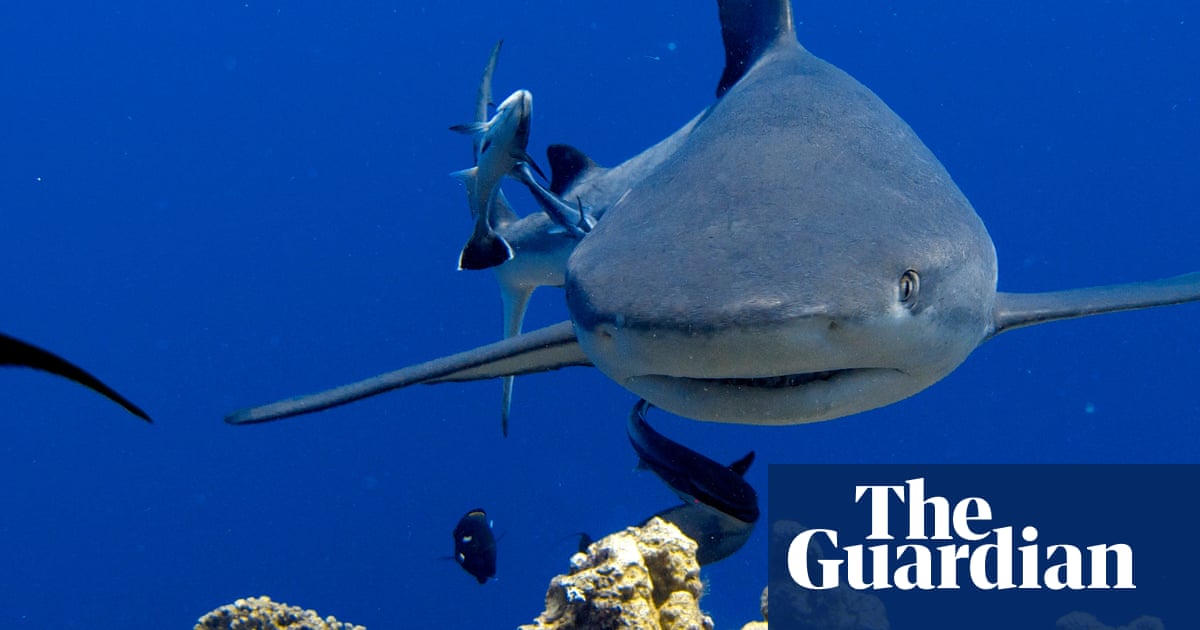The expansion of Queensland’s lethal shark control program will be challenged in court should it escape a looming entanglement with federal laws, according to marine scientists and policy experts.
The Queensland government announced plans to pump $88m over four years into the state’s shark management plan, which would see shark nets and baited drum lines rolled out at more beaches, as well as the expanded use of non-lethal technology such as drone surveillance.
The Crissafuli government announced its plan was one that “prioritised beach goers’ safety”, which it said was “put at risk” by the previous government to “appease radical agendas”.
“It’s clear the program had lost its way under previous Labor governments who failed to act and put people after the demands of environmental activists,” the primary industries minister, Tony Perrett, said ina statement.
But Humane World for Animals marine biologist Lawrence Chlebeck said the LNP was “simply playing politics” with a highly emotive issue, describing their shark policy as a “thinly veiled ruse” to appear supportive of the fishing industry by picking a legal fight “they know they’ll lose”.
Sign up for Guardian Australia’s breaking news email
Many commercial anglers are clamouring for more sharks to be culled amidrising rates of depredation of their catch.
Chlebeck confirmed HWA was already looking into a legal challenge – but federal intervention could mean that it “may not even come to that”.
As well as catching and culling target sharks, Queensland’s shark nets and drum lineskill, injure and entangle non-target species. Chlebeck said public data showed that last year 1,639 animals were caught in the program – fewer than half of which were targeted sharks – including 22 whales and dolphins, 37 turtles and 46 rays. More than 980 animals were killed.
Queensland’s shark control program has been running since 1962 and is grandfathered into the federal Environment Protection and Biodiversity Conservation Act, designed to protect threatened species.
But Chlebeck said that exemption came with a clause that the shark control program be assessed if it was expanded and shown to have a significant impact on threatened species
“The catch of protected species like whales and dolphins, the catch of threatened species like marine turtles and a number of shark species, including the critically endangered grey nurse, that could and most likely will open it up to review under the EPBC Act,” he said.
“The Queensland state government, they know all of this, so if they really want to push forward with these plans, they’re going to come into conflict with the federal government and the new federal environment minister – which may or may not have been their plan all along.”
But Chlebeck said the state’s “bluster” would end up “opening up their own program to a scrutiny it has never before faced”.
And the marine biologist has form when it comes to lethal shark control in Queensland.
Sign up toBreaking News Australia
Get the most important news as it breaks
after newsletter promotion
In 2019 the then Humane Society International had the state’s plans for the lethal use of nets and drum lines in the Great Barrier Reefquashed by the federal court of Australia, with a judge ruling the scientific evidence presented was “overwhelming” that the program’s culling of sharks did “not reduce the risk of unprovoked shark interactions”.
A University of Sydney associate professor of public policy and expert in the politics of shark attacks, Chris Pepin-Neff, agreed the Queensland government’s announcement was more about taking culture wars to the open water than implementing evidence-backed policy.
“I think there’s no doubt that the Queensland government believes that this is kind of a war on woke,” Pepin-Neff said. “This is definitely a tough-on-sharks kind of policy decision and it includes killing sharks – and making sure everyone knows that they’re killing sharks – as a way to provide political cover.
“There’s no real way to interpret this other than that the politicians have decided that they are going to win elections by killing sharks.”
A spokesperson for the federal environment department confirmed the Queensland shark control program was exempt from the EPBC Act “in its current form … as it was in operation prior to commencement of the act”.
“It is the responsibility of the Queensland government to ensure any changes to its program are still covered by the exemption and refer any action that requires an approval under the EPBC Act.”
The state government was contacted for comment.
